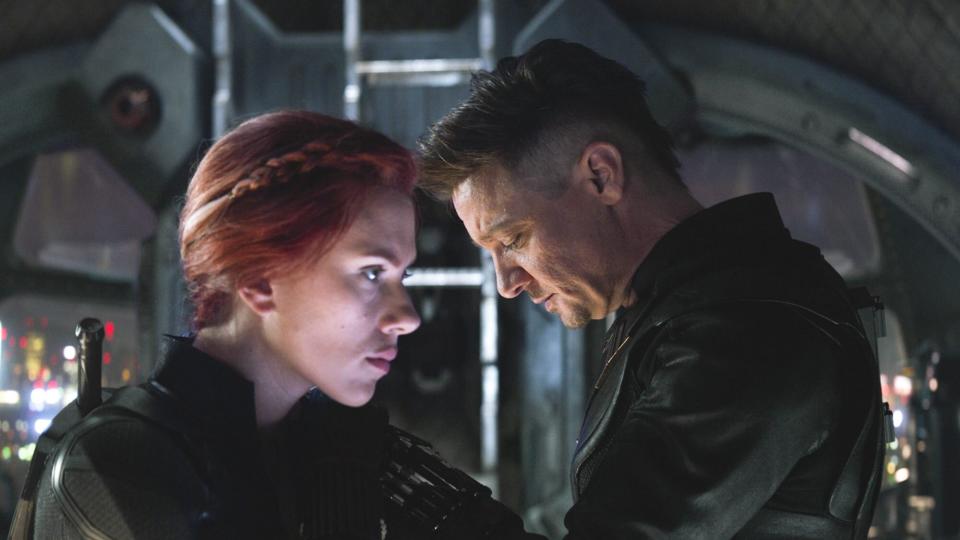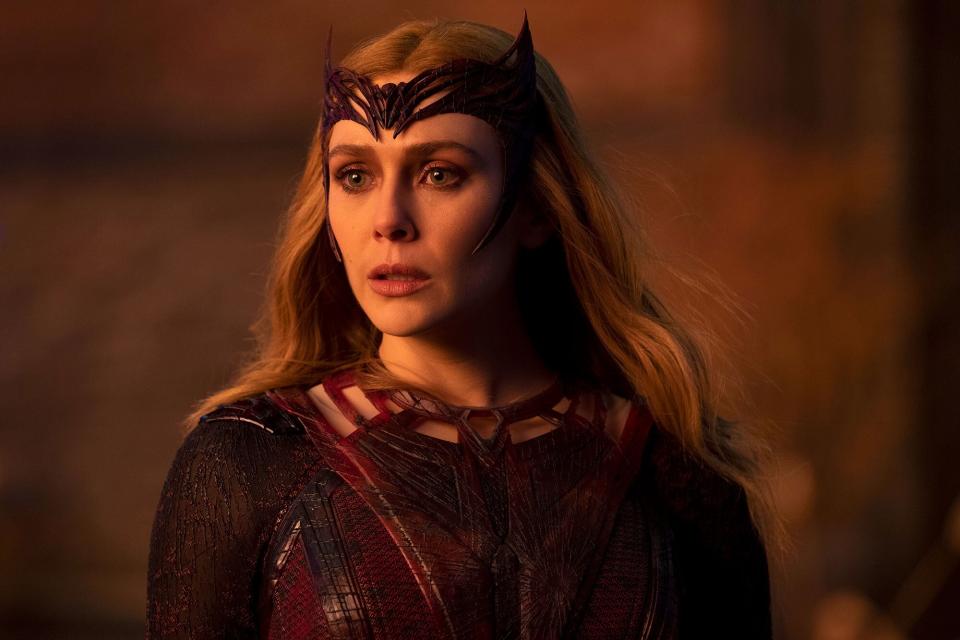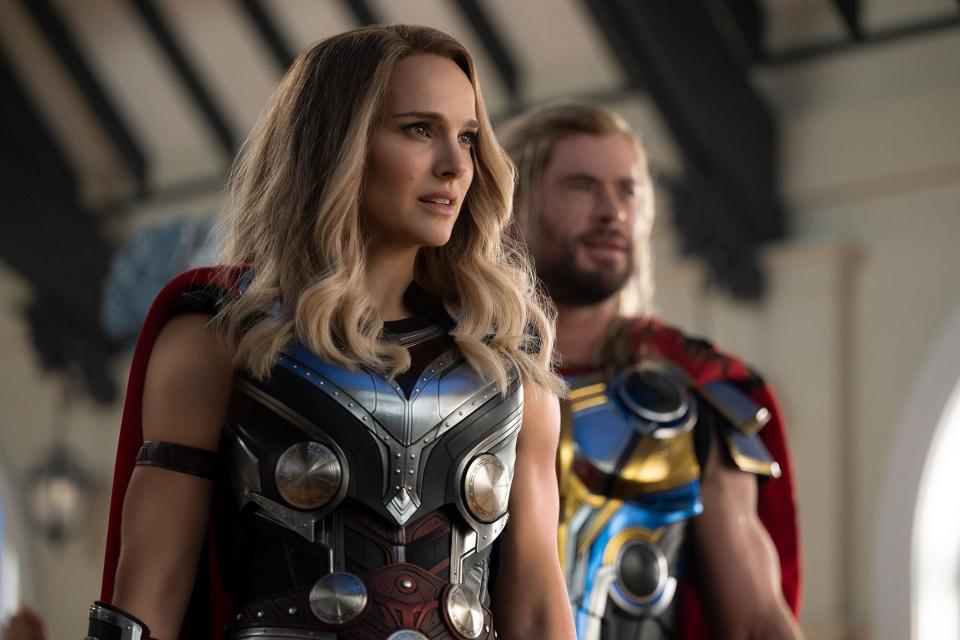We need to talk about Marvel's women problem
- Oops!Something went wrong.Please try again later.
- Oops!Something went wrong.Please try again later.
Warning: This article contains spoilers about Thor: Love and Thunder, as well as several other MCU titles.
Nobody's perfect. Not even superheroes.
But God, I am so very, very tired of investing in major female characters in the Marvel Cinematic Universe, only to see them meet an ignominious end. Let's set aside the fact that it took 21 tries to even get a female-led film, 2019's Captain Marvel. There have always been interesting, bad-ass women in the MCU — they just keep being done dirty.
The men of the MCU routinely save the day, seemingly with nine lives to spare (not that I'm complaining about having more Tom Hiddleston in my life, but for the love of the Norse gods, how many times has Loki been brought back from the dead?). Meanwhile, the women of the MCU's greatest asset seems to be the most stereotypically feminine of traits: sacrifice.
Don't get me wrong, sacrifice is a heroic quality. It takes a special kind of person to lay down their life for the greater good. But it gets exhausting when that special kind of person seems to be mostly female (thank you for your service, though, Tony Stark and Vision).
First, there was Natasha Romanoff, a.k.a. Black Widow (Scarlett Johansson), who, in the quest for the Infinity Stones, sacrifices herself for the Soul Stone, sparing Hawkeye's life. Her justification? Hawkeye (Jeremy Renner) has a family who needs him. So what does that say about Black Widow's adoptive sister Yelena (Florence Pugh) or other close friends who make up her found family?

©Marvel Studios 2019
A lot has been written about that narrative choice, and it's arguably the most polarizing death in the MCU. Especially since it came after Natasha's character endured outright sexism for years, particularly in the Age of Ultron, where the script reduced her to her reproductive choices, having her call herself a "monster" because she can't have children. Despite all that, it might've been possible to take her death as a moment of valor that served the storytelling — if Marvel didn't keep recycling that motif to motivate its male characters.
Here lies Gamora (Zoe Saldana), Aunt May (Marisa Tomei), Ajak (Salma Hayek), Wanda/Scarlet Witch (Elizabeth Olsen), and the newest addition to the dead fierce ladies club, Dr. Jane Foster (Natalie Portman). And that's not even including the saintly mamas who have died to light a fire under their sons (hi, Thor and Shang-Chi). Or the varying degrees of lip service to female empowerment Marvel has come under fire for over the years.

Marvel Studios Elizabeth Olsen as Wanda Maximoff in 'Doctor Strange in the Multiverse of Madness'
Sure, a past version of Gamora may be alive in the multiverses, and not even Elizabeth Olsen knows if her character is permanently dead after the events of Doctor Strange in the Multiverse of Madness. But I bet you can guess how she (maybe) died at the end: That's right, sacrificing herself for the greater good, even after being villainized for "breaking the rules," something her male counterparts do regularly. Sure, Wanda's rule-breaking might have cost many innocent lives, but it's not like she caused a universe-destroying Incursion (looking at you, Doctor Strange) or unleashed a wave of supervillains in a last-ditch effort to get into college (you too, Parker).
Even with all that, it was not until Thor: Love and Thunder that I finally reached my breaking point with Marvel's treatment of its female heroes' mortality. And I had such high hopes! Throughout the press tour, Natalie Portman made much of her return to the MCU being predicated on Jane finally having something interesting to do. The trailers showed Portman's Jane kitted out as a fully-fledged Lady Thor, complete with a winged helmet and wielding Mjölnir (did I maybe cheer more for this than even Steve Rogers proving his worthiness? Yes). What's more, here, she would not only become a hero in her own right, but she'd get to team up with another MCU favorite, Valkyrie (Tessa Thompson).
Imagine my irritation when the interesting thing they've finally given Jane to do is have cancer and die (yes, I know this is a storyline from the comics; it's still annoying). It's pretty evident from the earliest shots of her in the film that she's not long for this world. But it's a real pain in the Asgard that, like Natasha, Gamora, and Wanda before her, she only gets to step into the spotlight just as it's about to be extinguished. There are flickers of hope that becoming a Thor will strengthen and heal her. But for dudes, with great power comes great responsibility. For ladies, with great power comes an expiration date.
When Thor finally forces Jane to stop cavorting as a Thor and seek genuine treatment for her illness, he acknowledges he'll have to try to complete his mission alone. That is until Jane swoops in at the last minute to save the day (and his very well-toned butt), knowing full well the effort will kill her a lot sooner than if she waited in her hospital bed. Just like the women before her, she makes a choice — and that choice is to die for the sake of the world and the man she loves.

Jasin Boland/Marvel Studios Natalie Portman and Chris Hemsworth in 'Thor: Love and Thunder'
There is nothing wrong with this choice at face value. It doesn't make Jane (or Wanda, or Natasha...) weak or lesser than any of the male heroes of the MCU. Indeed, it's a death so noble it earns Jane a place in Valhalla. But it would be more emotionally satisfying if I hadn't seen it so many times before. And if it didn't feel like that, while the men of the MCU get to be arrogant, wholesome, angry, remorseful, and any number of complex things, women's clearest path to heroism seems to be death.
Sure, I want more female superheroes. More kick-ass ladies who I can dress up as for Halloween and cheer on. But not if their only purpose in the plot is virtual martyrdom. The MCU has taken great pains to make its heroes nuanced figures who grapple with the human cost of their adventures; it makes the case that there are many ways to be a hero. Unless, of course, you're a woman. (Florence Pugh, Hailee Steinfeld, Brie Larson, y'all might want to get a clause in your contracts, just saying).
Because women are expendable. We are living in a world where women are fighting for their lives and their rights daily, where misogyny is insidious, and women regularly fear violence from strangers and partners alike. It's easy to feel that the cost of our lives is cheap, that we mean more in death than we do in life. The MCU, intentionally or not, reiterates that narrative.
I don't want a fictional world of heroes where a woman's greatest superpower is death. It's a hill I'm willing to do anything but die on.
Related content:

